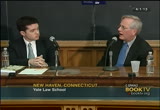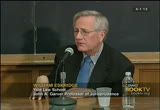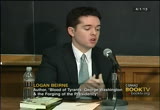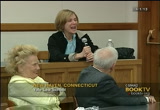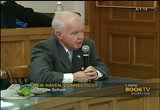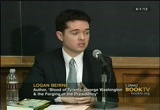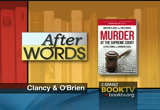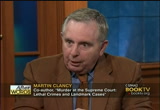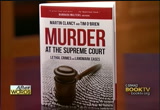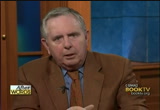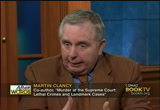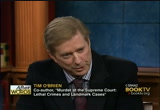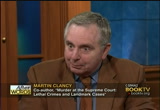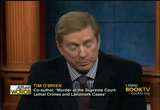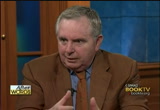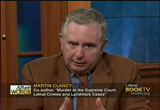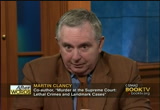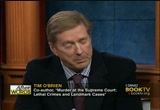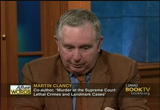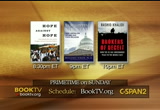tv Book TV After Words CSPAN April 21, 2013 12:00pm-1:01pm EDT
12:00 pm
issues. >> let me follow up on that. tell me if this is one of the lessons to draw from your account because some of the punchlines of your book is the concept of the republican expanding of the commander-in-chief clause and a major set of circumstances that we have the serious international commitment. ratified by the senate or the law of the land. and it sounds to me like one of the punchlines of your account, even though washington powers did grow, he did have a republican understanding, which required him to be very attentive to the commitments that were made by the nation. in the 1770s, we were not in position to make international
12:01 pm
commitments, but we did it with didn't have a lot of statutes on the book, but we have resolutions. would you not say when it washingtons experiences the commander-in-chief has a constitutional obligation to take seriously the commitment the nation has made in conventions like the geneva convention. ..
12:02 pm
>> i think it's important for the commander-in-chief to be looking at commitments that we make. >> others? more questions? speeches? opinions about canada? [laughter] >> [inaudible]. >> the former dean wants to make a speech about her youth. [laughter] >> i spent many summers canoeing in canada and singing every morning oh, candidate, which is beautiful. for that reason i made a point in junior high school of studying the history of canada, and why i had that little fact stuck up there. thank you.
12:03 pm
>> [inaudible] >> there was this young lady, young lady of the evening they called her, she was going back and forth from boston to the american side, the american lines. and the reason why she's going back so quickly and so often was that she was flying. she was carrying letters from the british to the american contact that they had in the army, washington's army. so they caught her some trickery that they did. but she would not tell them who the american person was that she had contact with. she refused to tell them. and and a number of accounts and said, this is all that said, he said washington and some of his staff spent the night with there. and in the morning she divulged who the person was. spent at length she was about to
12:04 pm
confession. she said she was proof against every, everything we tried for that length she was brought to confession. i think that brings out a good point how washington saw torture as something that we should rise above, and he wanted to get past the barbaric wars over the past and raise our level of conduct. but then as the revolution and wears on, he starts realizing, he's saying i'm more of those to torture. however, i am more opposed to not saving american lives. and that's when these instances start arising, when it comes down to if i need to do this to save american lives, that was a different story. >> i think the library is telling us we should bring this
12:05 pm
to close. i would like to announce that the director of "zero dark thirty" will do a version of lucas buck. [applause] >> for more information visit the author's website, bloodytyrants.com. >> up next on booktv, "after words" with kimberly tignor. this week, abc news veteran martin clancy and tim o'brien and the book "murder at the supreme court: lethal crimes and landmark cases." and it examined for capital punishment cases that they say defined the parameters that judges must follow an order to uphold a death sentence on appeal. the program is about one hour. >> host: well, i wanted to talk to you both, i find this is an incredibly important not to
12:06 pm
it's an important dialogue that's going on in the u.s. my first question i really wanted to ask you is, what compelled you to write this book? was a by particular experience? was there a journalist or -- >> guest: we found someone cases people focus on the legal issues as they should, but the stories behind the legal issues are compelling. they are fascinating. and that is particularly true with death penalty cases. we found what happens before the crime, what happens during the crime, what happened before the court's decision, how the court decided. and often after the court's decision what happened. it's fascinating stories trip to the more we dug in, this book takes you from the scene of the crime writing to the supreme court conference in many of those cases, and shows you the repercussions. >> guest: and we have stories to tell. i think the most important thing but writing a book is have something to say.
12:07 pm
here we had important decisions, landmark decisions, tough decisions. 10 of the 15 cases we focus on split the supreme court five to four. and stories surrounding the decision that read like novels even. >> host: i completely agree. one of the close i found i especially really like was from a former congressman jim kline and he said it's a little hard to believe that your nonfiction book you can't put down. and i thought that it was especially appropriate because if you like this book, it's different from a lot of nonfiction work that i've read. and that it really does read like a thriller. it really does, it takes these little discussions, and jack should manatee, humanity side to it. >> guest: we like to think it's an important book in the sense that it tells you how the court works. there are so few good books out
12:08 pm
there that explains what's the process, how do they go about this, how do they decide these cases, what are they saying to one another? we see these cases that split the court five before. what do they think? to the personal this get into it? so it's about not just about capital punishment. it's a book about how the court operates. >> guest: when he did get into those in the library of congress, the memorandum, the notes back and forth between the justices that are available him and a lot of stuff is available, you at least, i'm not a lawyer. but i was just passing by the human side. in many cases the justices have reservations. reservations about capital punishment. >> guest: there's one story about willie francis, and martin, you did a lot of research on that case, personally. it look like a dry supreme court decision to when you dig back
12:09 pm
down you discover it has all kinds of ingredients. the year is 1946. louisiana has a traveling electric chair. they would take it from parish to parish, county to county. they would display the literature on the county courthouse at noon, and invite school kids about the classes to come and make a field trip and look at the electric chair. don't do bad stuff because this chair is waiting. they then would take the chair inside, a good up to a generator on a truck and invite the victim our mandate the victim into the chair. in this particular case, 17 year old black and end willie francis who would kill the pharmacist during a robbery was put in the chair, strap in, electrodes attached to his ankles and to his head, and does one witness told, the executioner said goodbye willie, and willie didn't go anywhere. the chair malfunctioned. there was smoke and sparks and willie had minor burns, but they
12:10 pm
took him back to his cell. that became a celebrate supreme court case. was a double jeopardy? the court eventually decided it was only accidental. you could put willie francis in the chair again. but justice frankfurter who voted for the education -- execution because he felt mandate to do, he went behind his fellow justices backs, quite literally, and refined in louisiana, very powerful in the louisiana state bar and urged him to do everything he could to stop what he thought would be a travesty. the attorney did attempt to stop the execution. he could not. willie francis died a year later and the same hearse that had been waiting for him a year before took his body away. >> guest: one of the things we fight over and over again, that justice will split 5-4 on capital punishment, often even those who vote in favor of execution have greatness giving spirit not about the law but
12:11 pm
about the wisdom of going through with the death penalty. throughout its history and the united states supreme court from the 1960s on, we've found justices will vote to support, uphold the death penalty even though they personally felt it was wrong. they felt and a democracy this is a decision that the people must make. the state legislatures must make and it's not for us to decide. >> host: i thought just to kind of take a look at the unique and interesting research you did, and i thought the willie francis case was interesting. that you went and you went into these, went to the gas chambers and you went to these chairs, to the electric chair. i just want to be clear about what the experience was like. >> guest: no death row inmate has sent us -- it is, it reminds you of what capital punishment was all about. back in this room alive is being taken away by the state and user
12:12 pm
think about it a little more deeply. incidentally, there's so many questions about capital punishment. a difficult one of course is whether to advocate the one she decided to have as a training as, how it operates, who should be executed, what are the rules? those questions turn out to be even more difficult. we can say our book will provide you the answer, but i think we agree that helps you understand. >> guest: i call them knee-jerk fears about capital punishment. one is it's terrible. it's an abomination. we shouldn't have. and the other is that it is an instrument of justice that's perfectly proper. if we shake either of those knee-jerk there is, if we cause people to think, i went decided this book is a success. >> host: i think that's an excellent point. i think this has been a huge and wonderful contribution just to that discussion. i wanted to touch on what you
12:13 pm
just said. the united states is one of the fewest industrial lives democratic countries that still practices capital punishment. >> guest: really the only one we think. there's no other western and national democracy that practices the death penalty. >> host: do you believe this dates back, all related to the challenges we face in reforming, law and gun violence? >> guest: that's a really, that's a tough question. i sometimes think, and i don't know the answer to that question. i sometimes think our culture is a little different when it comes to crime and punishment than most other western democracies. guns are more readily available here than in any other western democracy. in countries like the united kingdom, it just doesn't, they are not there and yet we have one of the highest murder rates. so what do we do? we have capital punishment and we find that in the states that have the death penalty and they also have the highest crime rate
12:14 pm
your primarily in the south. and in those states that do not have capital punishment, like the northeast primarily, they have the lowest crime rate. is there a cause and effect? i don't know. may be. what comes first, the chicken or the egg? did they have th the death penay in the south because that such high murder rates or is it the other way around? the answer might depend on who you ask. opponents of capital punishment will look at it one way and proponents look at it another way. and what we do find in this debate when you look at the crimes and to look at the criminals who commit these crimes as we do in this book you find a great deal of sympathy for the death penalty. it's easy to support the death penalty when you look at the crimes in this book, and the criminals. but when you look at the system you have to have some cause. lewis powell throughout his
12:15 pm
crew, supported the death penalty. later he concluded it was a mistake and it just doesn't work the way it is supposed to. >> host: the point you said about sympathy and just relating to kind of the stories that are behind these cases. i thought that resonated with the daryl atkins case. as part of your research you did go and actually interview with his mother. i just wanted to know, not so much of the content but about what that experience was like. >> guest: a fascinating case. atkins versus virginia. the supreme court held you can execute someone who by state law is mentally impaired, retarded, whatever that level is. and it's a very tough case because most killers are not the brightest lights in the house. someone who is dimly a little on the thin side, should they be spared for that?
12:16 pm
who should make that call? should be denied state supreme court or should it be the jury that sees the defendant in court? in this case, another one of those cases that is truly, it's a fascinating story, and legally it is very important. this was a cold-blooded murder. stopped some guy out of a convenience store, for some in car, making drive to a bank, and atm machines and took out a couple hundred bucks and come out in the wilderness, and get out of the car and then shot him dead. just left him there. justice scalia and writing an opinion sound like prosecuted. he shot him once, twice, three, four, five. well, the supreme court ruled that he could not be executed if he was mentally retarded. but i need to find what is mental retardation. three juries said he qualifies for capital punishment under virginia law. they sent back to virginia supreme court, send it back to it for the jury to say, to
12:17 pm
determine what is usually retarded. and before a jury could reach a verdict, before it was on penalty found there was some prosecutorial misconduct in the trial years earlier. the judge finally threw up his hands and said, that's it, he gets life without parole. so the inmate who brought this case and led to this landmark supreme court decision, his case is not affected by the decision at all. it's just an amazing story. and the twists and turns in the case. and by the way, we work on something that is to help you understand the crime because something called qr codes in the book. martin is more techie than i am with a driving force behind it and you think is a really unique feature in the book that will make it more appealing to our readers. >> guest: was helpful as that the technology, take a smart phone or a tablet and you literally wavered over the code in the book and you get a video of the atkins case of many of
12:18 pm
the other cases we've covered. >> guest: one o of the cases recovered and fought with you can at the death penalty for juveniles. somebody who is under 18. this case involved a 17 year old who seem to be on a -- took an elderly woman out on a bridge, pushed her off. she drowned her and they pick him up at his high school the next day, and within hours he had a cheerful confession to police. and we describe is in the book but when you put the phone over the code, you can see the confession yourself. >> host: i thought the codes were neat way to just kind of come in almost takes the reader to even more into the book. and i was wondering what was the thought behind that? is this the direction in which books are going to be headed, especially nonfiction? it does create a great opportunity to just really grab your readers.
12:19 pm
>> guest: martin will explain this. i didn't understand what was. it just kind of gloomy away. >> guest: i can't predict which way the publishing industry is going to go because lord knows where the publishing industry is going these days. but for me, not only do you see, if you poke the video of simmons, the boy who confessed, you see not only his confession and the police station, but then the police taken back to the bridge so he can show the place where he threw the woman off the bridge. to me that it brings you literally to the scene of a crime that has an emotional impact that we think we're pretty good ride, but no way we can give you the kind of impact. >> guest: you don't see on eating his and you don't read about in the newspapers. made for television movies will try to duplicate it, but this is the real thing. >> guest: and i do think, you know, if you're going to get involved, first of all we all
12:20 pm
have a stake in this, but the fact that you might not have the answers is perfectly understandable because it is a tough question to you don't have to have the answer unless you're sitting on some court. did you look at these crimes, i think you have to, it helps you understand what it's all about. we talked to judges, we talked to lawyers, we talk to philosophers about capital punishment. sometimes i think lost in the debate might be the view of the undertakers who are there, pick up the body. they see firsthand what happens, and that's in the book. >> guest: and we have met some of these gentlemen. we've met some people who in my opinion at least are beyond retention. so is, people are angry and if these kind of animals are in the dock, i can understand feeling, they need, the desire for retribution. >> guest: one of the things would also be calm -- was also
12:21 pm
found, a lot of that also depends on who you ask but it te really is no convincing evidence that it does deter. the supreme court has sort of brought the, what it was the deter we don't know. we find that the real support for capital punishment now comes not in the name of deterrence around in the name of retribution. some call it revenge, some call it justice. to us its office in the. and it is certainly understandable. i have spoken to loved ones who were left behind when someone was killed. and the way the person killed it's awfully easy as. he is gone, but the family, it's a painful to them for the rest of their lives. they never forget. some of the relatives that i've spoken with actually had crusader against capital punishment. i would say what about the person who killed your father? will you make a pitch to that person, for clemency to the court to spare the person from the death penalty?
12:22 pm
i can't do that. perfectly understandable to me. >> host: both of you are very passionate about this. i was reading that you were saying that you thought about writing a book like this 20 years ago. it was just a matter of time. so i was just juries as to what was going on then it kind of started this conversation treachery this book was born on the metroliner. headed from washington tenure, we were going to new york to edit a piece. on juvenile crime and the death penalty. the more we talk and more thought about somewhere between delaware and new york city we decided we had to write a book or trouble is we're both world-class procrastinator can a lot of other things on our plate and it took us a long time to get there. >> guest: as martin says we are world-class procrastinator but i said we are not quitters.
12:23 pm
although sometimes there's a distinction is hard to make between, but we did put off for a long time and we are both semi-retarded now. were still doing a lot of work doing a lot of work to idle and doing more work than it did when i was at abc news, although i'm not getting paid as well. we said this is something that is worth our energy. and besides i don't want to go to a rest am saying we should have done it but it was your fault, or the other way, you say that to me. we felt it was a worthwhile project. and most importantly it's an important issue and we had something to say. we had stories to tell and legal principles to explain. we work to i think there will on the. martin is a storyteller from way back when with 2020. i've been doing legal analysis for 20 plus years. it was a marriage that work out very well. >> host: i'm curious as to where you see, how does this book fit into the larger discussion with groups like the innocence project and the recent
12:24 pm
exoneration of, due to dna evidence? where you think this book fits into that? >> guest: that's a very good question, which are booked and recent events bring to life. because the prospect of executing the innocent has always been a concern, always been an argument against capital punishment. what we are find is it's much more real, much more large than we actually thought it was. >> guest: researchers found a case in texas that it's almost certainly a mistake and execution. opponents of capital punishment are often challenged, find is a real case, finds a truly innocent person who is executed. this is probably, the case in texas is probably it. it's a case of eyewitness testimony gone wrong. it's a case of people being in the wrong place at the wrong
12:25 pm
time. but when you look at the menu is executed and the men who is now presumed to be guilty of the crime side by side in photographs, you have a hard time telling the difference. >> guest: our book doesn't take an advocacy position. this is not a book for or against capital punishment. the goal of this book is to show you the question. we do come to some conclusions about how the system doesn't work. but we are here today whether not capital punishment is right or wrong. >> guest: the risk of exiting the innocent as drawn strange reaction from some of the justices. look, it might help your cause if you point to one. well, looking at all the statistics, even then no one ever said the system is perfect are going to do away with all punishment because mistakes do happen? no. gifts a mechanism given to human frailty, human error, so there will be mistakes.
12:26 pm
well, except when his mistake and a capital case there's a remedy. the person is gone. well, death is different and there are some justice on the court to say the process has to be the same. so he had a very basic disagreement between justices who are very concerned about the risk of error and other justices who say they're concerned but it doesn't affect the outcome what he should have it or not have it. >> host: i want to take a step back because i know we got attached upon this early. and i thought it was just an interesting come you all have very similar and have different backgrounds but i just want to talk with you about the process of coauthorship and just how i wanted to hear about how that worked. >> guest: mostly bed. [laughter] >> guest: it is america we're sitting in the same room at the same table. a point of fact, point of fact, it was a delight. 490% of the time.
12:27 pm
we, the most -- >> guest: and the other 10% it was one of% not that allied. >> guest: the most widely used phrase from us was it can't say that. but i think having a friendship for 40 years to build on help to survive all the bumps. >> guest: but also what i think we found, we didn't have most of the chapters and some we worked on together. but there was an abiding respect one another's work. it was his chapter, i would say martin, i would make this change or that change. but he would have the final say. the same with my chapters. he would make recommendations to me. when we were done, when i read the book i felt all the changes we made were very beneficial. that he held my copy a great deal and i like to think i helped out your copy. and we did have some disagreements. some of them were reasonably strong but at the end of the day we reached the solution that we both really thought was best.
12:28 pm
the disagreements that we had yielded much more light than heat. >> host: i wanted to also talk about, i thought it was interesting where your title choice, because it reads murder at the supreme court. it reads like a thriller and a kind of, i wonder if he didn't purposefully? >> guest: that actually we were looking for a theme, our publishers and we have everything. just doing it about capital punishment, that's certainly been done before. i said what we want to do is want to tell a story and also to explain the law. from time to time in a 20 year period where we couldn't quite agree on what we are doing and said some day we will do it, we got together and set the theme would be murder of the supreme court, how about the cases, the crimes that may the law? and all these crimes come you think of crimes as breaking the
12:29 pm
law but these are crimes that the supreme court used to make the law, to shape the law, to define the law of capital punishment. when we agreed on that we said that's it. then the publisher changed it to legal crimes, lethal crimes and landmark cases. but the fact that we agreed on -- >> guest: which we have to agree was an improvement. [laughter] >> guest: i don't know. i think it works. >> guest: coming up with that team, the unifying theme was the hardest part. we made several false starts over the years. >> guest: the concern was there was another book called murder in the supreme court. that is a novel about a murder at the supreme court. we were concerned about that. you know, we weren't going to let that get in our way. this is "murder at the supreme court" at is how the supreme court used murder in the punishment that is appropriate for it. but i think it is a good time and it does capture what the book is all about. these are all legal crimes and
12:30 pm
what the court said about him, or just landmark decisions. >> host: i think what's neat about the time and the way the book is done, the barcode and where the stories are told is that i think you can opens it up the books are not necessarily nonfiction readers. i was just curious if that was done intentionally. did you know that was going to be out? >> guest: i think from the get go, my thought was, i was always kind of difficulty at abc news were have a terrific story. they never said no to me, go out into the people who brought the case of which was an amazing liberty and treat for me. i would come back and say i have two stories we. i have a decision from the supreme court that you want but i have the tigers human interest story behind the decision that you really want, too. they said we will give you another five seconds. it was so frustrating to have these great stories that i could
12:31 pm
not tell as a water. we could say more about the decision. not just what it was but what when intuit, and the story behind. martin as a storyteller, that resonated with them. he likes to tell stories and we had worked together on death penalty stories at 2020 which is such a treat for me to go out there with you, tocaloma to work on death penalty for juveniles, a very important case. and the opportunity to explain issues in that kind of detail and tell the stories behind that case was such a treat that you have the luxury on 2020 doing all the time, but i didn't. it was a real treat for me turn to it wasn't a case of giving him a few more seconds. >> guest: you have no idea what that meant to me. that was an out of body experience. house of representatives great. i think we're going to go to a break now. thank you so much.
12:32 pm
>> host: and so i wanted to take a moment to get into the real meat of the book, and talk about some of the cases that really stuck out to you both. >> guest: one of the truly landmark cases, anyone who practices that's been the law and luckily the court might of the case of greg versus george. the supreme court to of the death penalty in 1970 to find it was implemented in an arbitrary and capricious manner. that was like getting struck by lighting. you never know who's going to be executed. states rewrote the death penalty laws and another case came up in 1976 called greg versus george would have the opportunity to
12:33 pm
see with this they said that and perhaps reinstate capital punishment there is each case because opponents of capital punishment thought the order decision was just the first two and they could use the greg case to rid the country of capital punishment once and for all. supporters of the deathly said this, if we get humpty dumpty back on the wall, if the georgia law is upheld. troy craig was a hitchhiker who was taken by couple of good time charlie's a stop to get a case of beer and then they had to go to the restroom and then stopped again when they came back, craig had a gun and shot them both at point-blank range to steal the money and steal the car. the question was does he get death penalty? the supreme court look at how george had rewritten its law to give required one, a bifurcated trial which mention one part of the trial to determine if the person is guilty, and a second trial which is much more open ended to determine what the character of this person and what was so bad about the crime
12:34 pm
that would justify a death penalty. the court said the georgia law is fine. other states scrambled to meet what george had done to duplicate what george had done. we all assumed that gregg would be the first person to be executed. and anyway he was put on the way anybody thought. the night before his scheduled execution, he escaped from prison with four other inmates, said to be the worst killers in georgia history. the crimes they had committed were too gruesome in for our book which has some gruesome stories in it. the estate, went to north carolina, some of them are members of a motorcycle gang called the outlaws. they got together with some old friends, and gregg made the unfortunate mistake of sliding the girlfriend of one of the bikers. and picnic in a costume to the ground and stomped him to death. his body was found floating in a nearby lake a couple days later all the others were apprehended, but gregg, the escape which was
12:35 pm
so daring got him another 24 hours and that's about it gets back so he died, executed in a different way the law had intended. you can't make this stuff up. >> guest: but these stories, before the truck, before the crime and after the crime come after the supreme court decision, we find them fascinating. if you're a journalist and you're a writer, you won't have good stories to tell. there were others, too. we had one where the issue for the supreme court was whether you could forcibly execute, forcibly medicate a paranoid schizophrenic inmate to make him well enough to be executed. >> guest: the court has already decided okay, somebody is crazy, you can't put them to death. if somebody becomes insane after conviction, you can't put them to death. so here we have a case where somebody who became or was diagnosed paranoid schizophrenic after being condemned.
12:36 pm
the state of georgia wanted to medicate him so they could execute in. >> guest: against his will. >> guest: they wanted to medicate him so he would become sane enough to excuse him. that became a big supreme court issue. the court looked at it, accepted the case because it was an interesting question, and then for some reason punted pickett did not decide the question that get sent down to the lower courts for examination. i talked to the trial judge and he said i was scratching my head. i have no idea what these guys once. day we heard the case. eventually louisiana state supreme court made a decision that you couldn't medicate to execute, but the supreme court didn't make the decision in that case. >> guest: one of things we uncovered was this inmate, this murderer, michael perry, he was arrested in washington, d.c. and action had come to town here, was talking supreme court
12:37 pm
justice sandra o'connor. i mean, that was, that surprised him because she's sober to indicate that she didn't remember it because it was unfortunate those things to happen with supreme court justices, victims of threats. but as martin was saying, his intestines was later set aside by the louisiana supreme court. and now what we hear is the of the whole wing to himself in the georgia state penitentiary, angola, because he spends the wee hours of the morning wandering the house -- the halls shouting to only those he can't see any. >> guest: i started this book, louisianlouisian a case and its louisiana state penitentiary in angola. >> guest: another one of those cases, another one of those issues that are very, very tough. the supreme court said what he do with them into, whether it's on death row or not, who doesn't want to take his medications?
12:38 pm
and the court said, well, if you can show that it is medically necessary, you can force it to medicate them. but what doctors going to say yes, it's medical necessary so you can kill the guy? another one of the issues, i used to lie awake at night thinking about, it's so troubling that because i cared which was the right way to go but these are puzzles. in this case the question was, can you use victim impact statements? you are deciding whether this person has been convicted, committed the crime, should the jury hear about the impact on loved ones left behind? there were three cases. i think three of us warble cases in the book, and initially the court said you can't. because if you do, somehow, if someone, relatives are articulate and speaking about what the law -- with the losses, the perpetrator might get death penalty. there happened to someone who does have articulate relatives, loved ones left behind or
12:39 pm
somebody nobody really knew, well then, the perpetrator might escape the death penalty. should be no bearing on. it should be based solely on the crime and criminal. i would lie awake and i do forget what is the right answer. it does seem relevant with the impact is. the supreme court divided 5-4 with justice louis about writing the majority opinion saying no, that's not relevant. just look at the crime and the criminal. the court, another case cannot, the court split that decision in a heartbeat. washington, d.c. supreme court heartbeat which is a couple of years actually. it was only a change of personnel that did it. the court went 5-4 the other way. >> guest: if you die without most is to speak for you, that's a different situation. is the sense going to be dependent on the survival of victims relatives and their
12:40 pm
eloquence? scary stuff. >> guest: i still think that's a tough call. i don' don't know what the right answers but fortunately all got to worry about is presenting the question properly. we don't have to have the answers. i also, when you look at these cases you understand the real difference between having an opinion, which we're all entitled to and take no responsibility for usually, and making a decision. john roberts when he was nominated to be chief justice, address that in his confirmation hearing. when you have to make a decision with allies and the like of you sometimes look at these cases also differently. >> host: that's an interesting point because i know a large part of this book is about you gathering the information. but i sent you have an opinion on this and i think that it is somewhat throughout the book, do you think it'd any sort of impact on the way that you -- >> guest: we tried very hard not to tip our hand. >> guest: what we found was
12:41 pm
when we talk about these crimes and criminals, the book is sort of a pro-death penalty tilt. and that troubled us. >> guest: and originally we did not want to present any conclusions. we wanted it to be sort of hands-off, here are the facts, you decide. the problem as tim said it started because of all the brutality of these crimes, the crimes they get to the u.s. supreme court are not your 7-11 robberies or domestic homicides. these are for the most part crimes against innocent people who are in the wrong place at the wrong time. committed by people are very violent, very screwed up people. the more we presented the details of those crimes, the more viscerally we felt readers would feel, okay, the death penalty is just fine. we take no moral position about the death penalty. you guys decide to. but what we conclude and we concluded we have to conclude for the sake of our readers and to be honest, we had to present our reservations with the way
12:42 pm
the system works. that's one that you should have the death penalty. the fact that the system does not seem to work and any applicable way. for more than 200 years, the brightest, most caring, most dedicated minds in a society through state legislators, on the bench, on the supreme court, and in the legal community have tried to figure out a way to fairly administer a death penalty, to do in an equitable manner, that we would all become to be with. >> guest: in 1972 the supreme court threw out capital punishment because it found as was said earlier in intimate anyone made it 30 years later, it didn't seem any better to us despite all the fine-tuning of the court has done. we find that race figures into. not so much the race of the perpetrator although that is affected by the race of the victim. we find that poverty, we find all the people on death will have one of three things and come. abject poverty, victims of child abuse, little or no education. and you ask yourself, that's not
12:43 pm
an excuse. that's not a defense. but to some extent my we be executing them because of the sense of the parents? it gives me some pause. also another problem is they are all broke. they have no money. they don't have good lawyers. sometimes, in some soda case, the quality of legal representation is superb, and into many of them it's absurd. people are since to die not because they committed the worst crimes but rather because they have the worst lawyers. and we see that over and over again. these arbitrary factors figure in the sugar no bearing on them at all but they do have a profound bearing. >> guest: the longtime warden at san quentin together 90 people, 88 men, two women. he said i never executed a rich person.
12:44 pm
>> guest: the question still is not that are theoretically if you could do any rational way, and if you could do it in such a manner that really does deter, that it really does better than anything else serve society's demand for retribution, it's interest and recognition, should you still haven't? well, it's not brain surgery. the facts are out there and i think everyone should be looking into the own hard to make their own decision on the morale of the of the death penalty. we offer no opinion on that at all, but only as a practical matter it doesn't seem to work the way anybody had hoped. >> host: i know that this discussion is an evolving discussion about the death penalty and i was curious when you're doing your research, was there in the case that stuck out to you that you do think might be different if it had been done or tried today? >> guest: well, you know, i've been trying to predict what the supreme court will do for many
12:45 pm
years, and my closest friends that dinners on them. to get the right answer, you think you have to study the case. that's not the way. you want to get the right answer you look at the courts. i sometimes think of the courts as one organism with a multiple personality disorder, and how is going to good is what and how is it going to go that way. and it really does depend on the court. one of the things we found is the court has been equally divided on this issue for many, many years it and it is going to be any change it's going to be as a result of the change in the composition of the court to get a few more justices who oppose capital punishment, a few more states to do away with it, and you could find a majority of the court not today, not tomorrow but at some point down the road saying we've had, we're not going to do it anymore. >> guest: you do find that no state is adopting it fresh, but
12:46 pm
a number of states slowly are moving away from it. and you are also finding that jurors have become less prone to return death sentences. there are a number of reasons for the. for one when you have capital punishment, the public doesn't want it and we don't have and the public cries out for it. but also get a very important supreme court decision which we reference the book, we don't go into a great deal of detail about it, but the supreme court has held that if there's an alternative sentence of life in prison with no parole, juries must be advised of that. if they are not advised of that you've got to do all over again. so when juries know they have that choice, death or life without parole the person will never see the light of day again outside of the prison wall, we find that are more inclined to vote for life in prison. we talk about it being arbitrary and capricious. one of the strange things we know, you are not about 15,000
12:47 pm
homicides a year into u.s. that's down over the last few years. several hundred death sentences a year, but over the last three or four years we have been averaging about 40-50 executions. you see it's out of whack. so many death sentence, sony homicides that so few executions. when gregg v. georgia was argued, its arbiter and capricious only in the sense that many killers deserving the death penalty don't get it. don't get execute when they should. that's no reason to do away with it. but look at it this way, what if you say pick a card and you pick the wrong card, you're going to die. well, nobody would go a long with it. that's bizarre. but in a way as a practical matter that's the way this seems to play out. you have nowhere knowing who is going to be given a just and whether that sentence will actually be carried out. except you do know that if the
12:48 pm
victim is black or the victim is white, where the victim is, the perpetrator is for doesn't have any money, the death sentence is more likely than if not. those are factors that should not play into at all but they do. >> guest: the future of the courts is one factor. what's happening in the states is interesting. we both live in maryland where there's an interesting microcosm on the national debate for two legislative sessions in 2007 and 2009, there were efforts pushed by the government to repeal the death sentence, the death penalty in maryland. that effort didn't succeed until just two months ago. the public opinion about the death penalty is interesting enough in maryland is in favor of it. the support is sought. most of the people who support the death penalty also feel that it does not deter crimes. so things are changing at the
12:49 pm
state level. >> guest: one of the worst crimes in the book, one of the victim impact cases i was referring to earlier, involved one of the worst crimes, truly cold-blooded murder in 3-d. it was just horrible. he has been on death row for over 30 just as most of you on death row die of old age like the rest of us. >> guest: then there's the matter of closure. if the relative gets murdered and someone gets a death sentence, you can be sure there will be 15 to 25 years of reviews and agony before there is closure. booth has a role here, a hearing -- >> guest: about once a year. one of the last things were told by from the victim's daughter, he looked at her and winked and said see you next year. how bad is that? if you want closure, maybe they feel, the family feels the only closure that would mean anything
12:50 pm
to them would be for booth to be put to death. but the real closure in our view might be more meaningful if you had a license and all the appeals moved away. but with a death penalty appeals don't go away. congress try to short-circuit those appeals to create other concerns that maybe someone will be executed who is innocent, or whose rights were violated at trial. we don't want that either. one of the things we're finding in this country does have a very strong commitment to what's called due process of law. sometimes referred to as triple fair play. but it's a lot more than simple template. we wanted to be strong rules to protect all of us. and with those rules in place we have to ask ourselves, maybe our society what it is maybe we've made it impossible to implement capital punishment in a meaningful way. to be meaningful it must be swift and it must be certain. it's not going to be swift it seems with all of the
12:51 pm
protections we now have in place. may be we do period we said that it is not the answer. >> host: that's an interesting question because the coach made earlier about how it's much were difficult or less likely for juries to necessarily go the route of the death penalty, and i was curious if you thought why that was? i know your book talked about the history of actually executions how they were once public and then became a bit disturbing and they then took it indoors. it's an interesting evolution, and just to think about where we are today, do you think that the quality of evidenc of the evidew is available come is that the reason why the threshold is higher? why do you think that is? >> guest: we are learning more and more about evidence. what we used to take as gospel about forensic evidence compare samples, for example, is now a whole new question, given the fact that there have been terrible forensic guidelines that led people in the wrong
12:52 pm
direction. eyewitness testimony we are now learning this lesson less reliable. there's a lot we are learning about how the criminal process works that we didn't know before. >> guest: the evolution of dna evidence gives i think jurors greater pause, more uncertainty about imposing a death sentence unless they are actually certain. in maryland before it abolished capital punishment passed a law saying you either have to have dna evidence establishing guilt beyond a reasonable doubt, or the crime must have been committed on videotape or something equally compelling for anybody to be given a death sentence. the concern is great and in illinois, the death penalty for many years and the governor said research by the innocence project at northwestern law students show mistakes are made left and right. i think jurors know about that. and less proof is truly beyond a reasonable doubt, it has to be
12:53 pm
beyond beyond a reasonable doubt for them to return a death sentence. and i think that's one reason why you don't see as many. >> host: your point about the impact it's having on certain communities and especially with things going on in maryland, was an interesting point. i just want to kind of go into that a little bit as it applies to the research. >> guest: there's a flipside of maryland and illinois, and that would be texas, where there's no inclination there that they want to do away with capital punishment. anyone who's run for office who proposes as much isn't running very long or isn't running very far. so there are pockets that cry out for capital punishment, ma and i don't think that's going to change. >> guest: georgia is another. there's an interesting phenomena in georgia going on right now. there's a shortage of the chemicals with which to kill
12:54 pm
people because the manufacturers of the traditional lethal chemical cocktails have withdrawn permission for those to be used in execution and are not available. the state of georgia is in a quandary because it's a limited supply just expired at the expiration date on the test tubes for their lethal injections make it impossible for them to injecting them into anybody for any reason. now they have gone to the state legislature just passed a law awaiting governor's signature which impose secrecy on the fact that compounding pharmacies might be hired to put chemicals together to be used in executions. under that law it would be a state secret about what the chemical was. a state secret about who manufactured. a state secret about any physician who helps in the process. we are talking about capital punishment going undercover in a way that i think is pretty
12:55 pm
scary. >> guest: there are efforts to fight this period human rights organization in atlanta and has been a helpful to us, the southern center for human rights a theses trying very harde inmates, no matter how, this defendant, them out how guilty they may appear, at least have adequate representation. and also to make sure that these cases are exposed and fedecamaras are allowed in the courts in georgia to see what's going on there. because i think a lot of people would be surprised at it doesn't work out. >> host: and just to talk on that point as to when adequate representation like ensuring that that actually takes place, at what point do you find in your research did you find absolutely essential that this take place? >> guest: it was 50 years ago this month, figures the last month, march that the supreme court ruled in getting versus
12:56 pm
wainwright that in all state courts anyone charged with a felony should be entitled to celtic and we find in many parts of the country that what they call adequate or assistance of counsel is nothing more than having a lower their who says here's the deal. 25 years or 50 years, you should be guilty. that happens and people are pleading guilty to crimes because that's the best deal i'm going to get iraq would have to go to trial and you think i might be convicted. that does happen. i do think that judges go to greater lengths to assure effective counsel in death penalty cases, but still we have cases where lawyers failed to show up on they showed up drunk in a double murder case. where the lawyers make mistakes, that clearly would have prevented a death sentence and its duly. we just recently had a case before the supreme court where
12:57 pm
the inmate got new lawyers but his new lawyers didn't get the information they need about the case and it was overlooked. we have some justices saying, well, that's too bad, he still should be executed. i mean, the system is broken. where ever you are on capital punishment, where ever you are on the moral question, you have to first get to the practical question, can we do any meaningful rational way, at the conclusion is we haven't. >> host: i want to thank you so much for doing this. this has been an absolute treat and a really, really appreciate it. >> guest: thank you. it was a pleasure being with you. >> host: thanks so much. >> that was "after words," booktv's signature program to which authors of latest nonfiction books are interviewed
12:58 pm
by journalists, public and policymakers, legislate and others familiar with the material. "after words" airs every weekend on booktv at 10 p.m. on saturday, 12 and 9 p.m. on sunday, at 12 a.m. on monday. you can watch "after words" online. go to booktv.org and click on "after words" in the booktv series and topics list on the upper right side of the page. >> you are watching booktv on c-span2. here's our primetime lineup for tonight.
97 Views
IN COLLECTIONS
CSPAN2 Television Archive
Television Archive  Television Archive News Search Service
Television Archive News Search Service 
Uploaded by TV Archive on

 Live Music Archive
Live Music Archive Librivox Free Audio
Librivox Free Audio Metropolitan Museum
Metropolitan Museum Cleveland Museum of Art
Cleveland Museum of Art Internet Arcade
Internet Arcade Console Living Room
Console Living Room Books to Borrow
Books to Borrow Open Library
Open Library TV News
TV News Understanding 9/11
Understanding 9/11